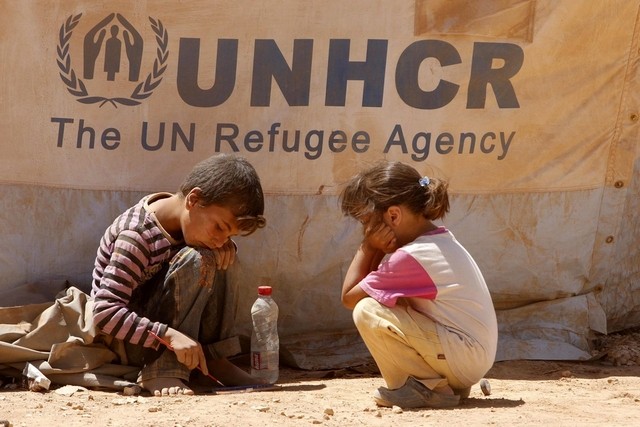
Thousands of children along the Syrian/Turkey border could soon have access to a new app to help them learn while displaced by the civil war.
The Syrian war has forced more than 11 million people to flee their homeland. While unable to help address the violence in Syria, a new effort is under way to give these refugee children a game-based learning app to help them to practice their reading skills.
With its Twitter hashtag-ready title the EduApp4Syria competition was conceived by a group of researchers, mobile network operators, and education experts to award $1.7 million to one development team to create an Arabic language app specifically designed for Syrian children between the ages of 5 – 10.
Student attendance at Syrian schools hovered around 90 percent before the conflict began. Attendance has now dropped to around 50 percent, with some areas in Syria plummeting to 5 percent. At least one-quarter of schools now have other uses, lie empty for fear of bombings or, in some cases, have already been destroyed.
“I talked to some Syrian developers that are moving to Turkey just to help with the process,” said Alf Inge Wang, game technology professor at Norwegian University of Science and Technology.
Wang, who’s also a co-founder and Games Professor in Residence at education platform Kahoot!, heads the five-person jury of experts charged with choosing the first five applicants who will go on to compete for the final EduApp4Syria selection. The jury also consists of other learning and literacy experts, a psychologist, and a Syrian language and culture consultant who is also a refugee.
The competition is one of many initiatives not-for-profits have implemented in Syria since the civil war began more than five years ago. Liv Marte Nirdaug, a senior adviser at the Norwegian Agency for Development Cooperation (Norad), told gamesandlearning.org the idea for an app contest came from her organization’s need to find new ways to educate with technology, and an awareness of Syrian refugees’ handiness with smartphones.
“How would it be possible to do something richer with mobile technology while targeting a group from a Norwegian perspective? They’re tech savvy with high rates of phone ownership. So it’s a combination of need and opportunity.” Nordhaug said.
Much has been made in the media about Syrian refugees’ reliance on smartphones to stay in contact with relatives while navigating their flight from conflict. Smartphone ownership among Syrians ranges from 75 to nearly 90 percent in some areas.
But Nordhaug — who was among a group of researchers who traveled to Turkey earlier this year to determine if an app would even be appropriate —said Syrian parents seeking safety in refugee camps were excited about the possibility of a literacy app their kids could play, in part, because of an unexpected adversary: boredom.
“We’ve been to the Syrian border and Istanbul, and had focus groups with a number of Syrian refugees on the Turkish side. There are times when they just need something to do. ‘Is there time to play a game on the phone? Let’s do that!’ Even though they are impoverished they still have wi-fi. It’s amazing. Refugee camps are supporting our assumption that kids are allowed play games on their parents phone. Just like here. Maybe even more so,” Nordhaug said.
“Water, food, smartphone and internet access. That’s the reality many of them are in,” Wang said
But despite the ubiquity of online access and smartphone ownership, a successful game-based app has to deal with a series of challenges, such as inconsistent connectivity. This means that the winning app would have to be fully-functional offline.
Norad is also relying on consultants to ensure the winning app is appropriate for Syrian parents skeptical about a western app.
“If the resulting game isn’t motivated or considered appropriate by Syrian parents they won’t play,” Nordhaug said.
At the same time, Wang was reluctant to put too many restrictions on what type of apps they hope to seen in the application process.
“We haven’t put out any restrictions. We’re hoping to be blown away. That said, we’re hoping to see games where [Syrian children] could construct things, that are Minecraft inspired, using levers and similar, simple mechanics. Game that allow them to create your own stuff. Games that allow creative freedom. Good for learning. Something simple with simple gameplay mechanics,” he said.
Competition organizers hope to have an app available for download by the end of this year.
“We could do something quicker, but there would be less quality,” Nordhaug said. “If we did something quicker, we would have to go to a company and say ‘We pick you.’ Then it would be business as usual.”
The deadline for final submissions to Norad’s EduApp4Syria competition is April 1, 2016.
